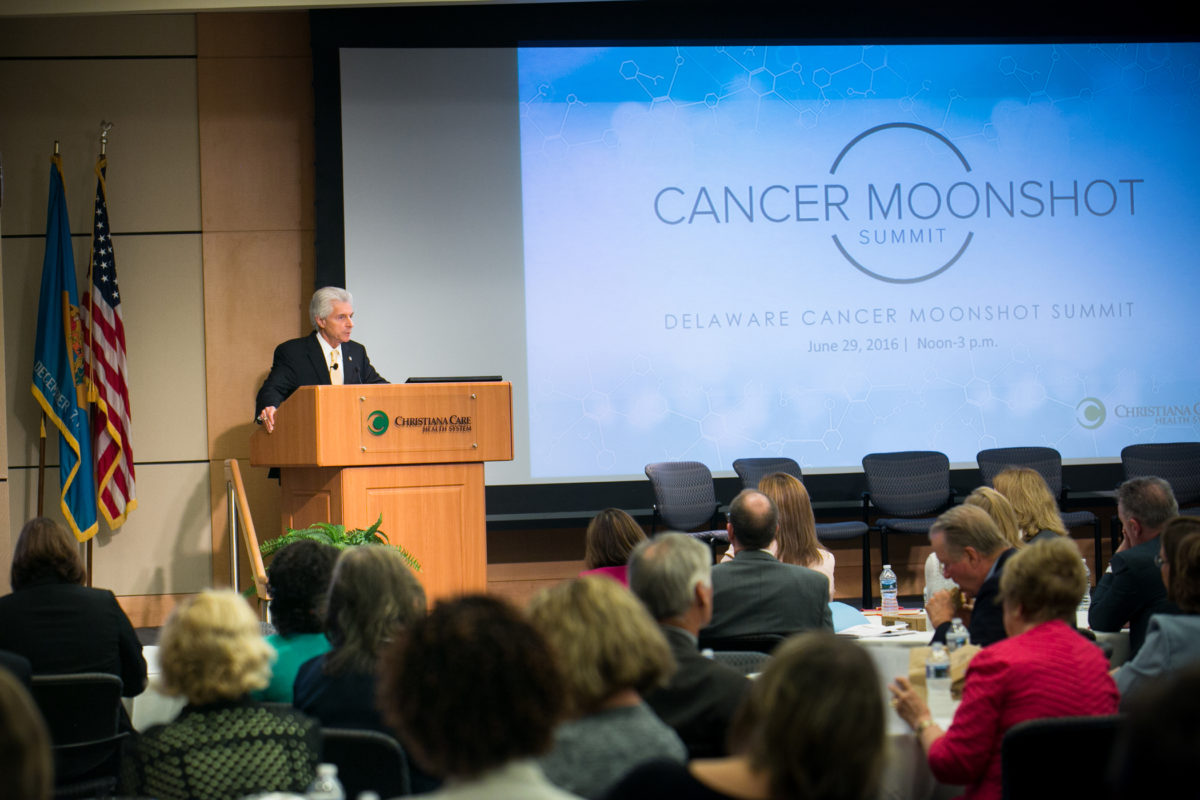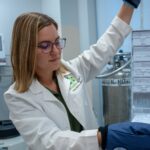Nearly 180 people gathered at Christiana Care’s Delaware Cancer Moonshot Summit on June 29, where they learned how innovative partnerships and research are positioning the health system to be a leader in the National Cancer Moonshot Initiative to accelerate progress in cancer prevention, diagnosis, treatment and care.
The summit at Christiana Care coincided with Vice President Joseph Biden’s National Cancer Moonshot Summit in Washington, DC. The summit was one of more than 260 held nationwide convening researchers, medical professionals, cancer survivors and others to discuss how to eliminate the disease.
Cancer is expected to claim the lives of 2,000 Delawareans this year. It’s predicted that in the First State alone, 5,000 residents will be diagnosed with the disease. But Delaware is making great strides — its rate of cancer-related deaths is dropping at more than twice the pace of the rest of the country.
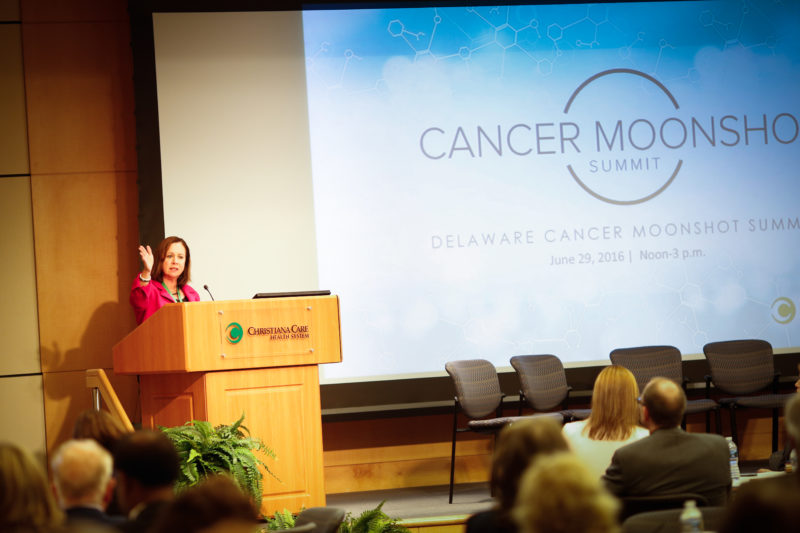
“Today’s summit is the first time that individuals and organizations representing the entire cancer community will convene under the national goal of doubling the rate of progress toward a cure,” said Janice E. Nevin, M.D., MPH, Christiana Care president and CEO. “That’s a big bet. Deal us in. It’s high time we all take action.”
Dr. Nevin stressed that two key words from The Christiana Care Way – partnership and innovation – can accelerate the pace of progress in cancer research, prevention, treatment and care.
Presentations at the summit highlighted Christiana Care’s and the state’s leadership in addressing cancer disparities, gene editing, translational cancer research, clinical trials and behavioral science.
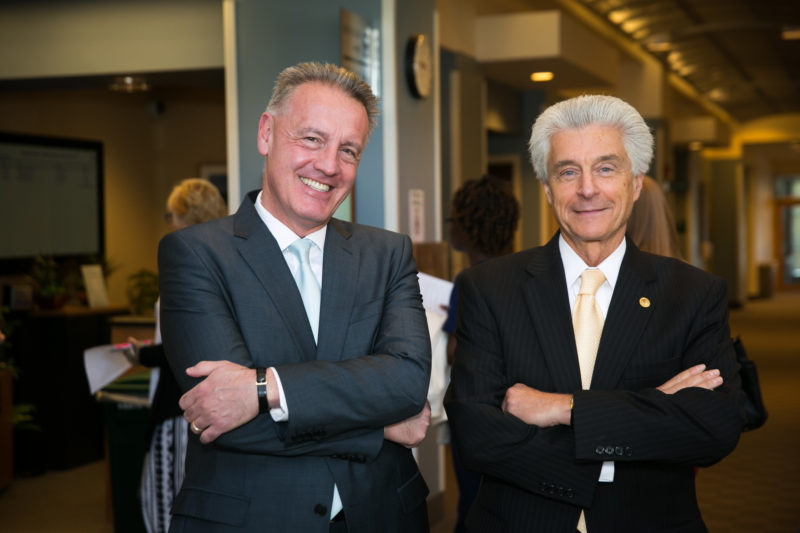
Unprecedented partnership
The opening presentation spotlighted the historic partnership between the Helen F. Graham Cancer Center & Research Institute, one of the nation’s largest community cancer centers, and The Wistar Institute, the nation’s first National Cancer Institute-designated cancer center dedicated solely to biomedical research. The affiliation is the first-ever inter-institutional and collaborative affiliation between a basic research institution and a community cancer center.
“The Graham Cancer Center’s partnership with Wistar has created unique opportunities for collaboration in cancer research, bringing together for the first time basic and translational investigators with dedicated community oncologists,” said Nicholas J. Petrelli, M.D., Bank of America endowed medical director of the Helen F. Graham Cancer Center & Research Institute. He outlined two projects involving biomarkers for the early detection of lung cancer that have been fast-tracked as a result of the partnership.
“With each institution’s infrastructure and programs adding to the strategic value of the other’s research vision, the whole of this partnership is truly greater than the sum of its parts,” said Dario Altieri, M.D., president and CEO of The Wistar Institute Cancer Center. “This partnership will advance important scientific discoveries that can accelerate the path to prevention, diagnosis, treatment — and eventually help lead to the cure of many cancers.”
The day before the summit, the Gene Editing Institute announced its partnership with Wistar to accelerate breakthrough cancer research in the human genome. According to its director, world-renowned molecular biologist and gene editing pioneer Eric Kmiec, Ph.D., the Gene Editing Institute is embarking on a clinical trial using an enhanced CRISPR gene-editing tool. The CRISPR tool was approved in June for its first human tests by the Recombinant DNA Advisory Committee, an ethics panel set up by the National Institutes of Health.
“The clinical trial at the Graham Cancer Center will be one of the first in the U.S. using this advanced gene editing technology,” he said.
Researchers at the Gene Editing Institute recently made a breakthrough discovery to greatly enhance the precision of CRISPR in editing the human genome. They did so by combining CRISPRs (clustered regularly interspaced short palindromic repeats) with short strands of synthetic DNA, called single-stranded DNA oligodeoxynucleotides. The combination enables researchers to better identify and develop innovative, personalized cancer therapies.
Via webcast, Vice President Biden said that what he knows about cancer, he learned from helping his son, former state Attorney General Beau Biden, battle a brain tumor that claimed the 46-year-old’s life a year ago.
Biden recalled having to enlist the help of his son-in-law, a surgeon, to gather Beau Biden’s medical information and fly it from Walter Reed Army Medical Center, where his son was a patient, to his doctors at the MD Anderson Cancer Center in Texas. Health records should be able to flow seamlessly and ubiquitously, he said.
The Moonshot — named after President John F. Kennedy’s challenge to land a man on the moon — aims to achieve revolutionary results for mankind by breaking down silos and sharing information, underscoring urgency, making care affordable and eliminating unnecessary regulatory hurdles, Biden said.
“I firmly believe we can do in the next five years what normally would take 10,” he said.

Delaware’s record of success
Through the Graham Cancer Center’s leadership with others in the state, Delaware eliminated the disparity between Caucasians and African-Americans in the rates of colorectal cancer incidence and mortality.
“We actually moved the needle in 10 years,” said Congressman John Carney, who spoke at the summit. “I couldn’t be more optimistic this time … that we can do even better. We ought to be able to do here in Delaware what no other state in this nation can do.”
Jennifer Sims-Mourtada, Ph.D., senior clinical scientist and director of translational breast cancer research at the Center for Translational Cancer Research at the Graham Cancer Center, said her team is focusing on disparities in outcomes, especially with triple-negative breast cancer, an aggressive form that disproportionately affects African-American women and for which Delaware has the highest rate in the nation.
Researchers are making progress identifying blood-based biomarkers that could be used to create targeted therapies, she said.
Christiana Care also tops the industry in the rate of patients participating in clinical trials – 21.2 percent compared with 3 to 4 percent nationally, said Gregory A. Masters, M.D., principal investigator, National Cancer Institute Community Oncology Research Program (NCORP) at the Graham Cancer Center.
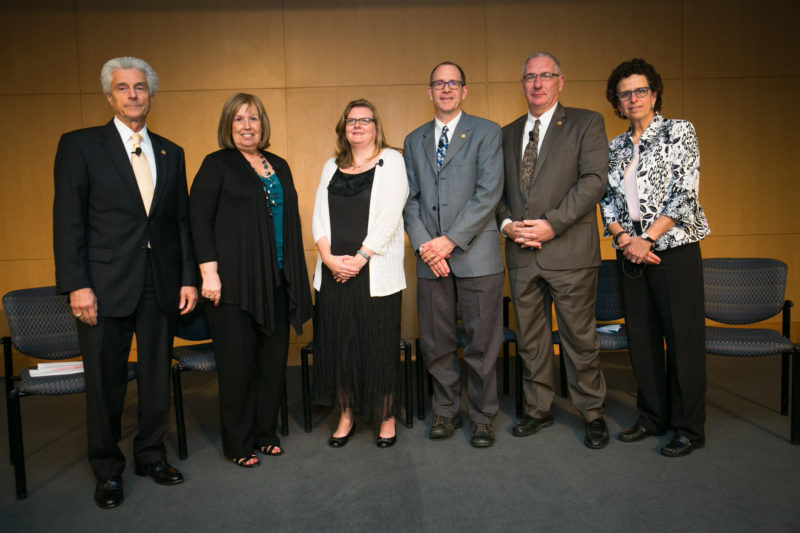
In addition to Congressman John Carney, other dignitaries in attendance included Delaware Department of Health & Social Services Secretary Rita Landgraf, Wilmington City Councilwoman Sherry Dorsey Walker and Wilmington City Councilman Darius Brown.
On a closing panel presentation, Linda Larimore, who was diagnosed in 2011 with Stage 4 colorectal cancer, the same disease that claimed the life of her father, spoke passionately about the importance of participating in clinical trials.
She has taken part in several clinical trials, and her colon and liver are cancer-free, but the disease has spread to her lungs. If any other clinical trials are available, she told the crowd, “Sign me up!”
Dr. Petrelli, who moderated the panel, said Larimore was a perfect example of how “we’ve turned cancer into a chronic disease. When I was in training, you wouldn’t have been able to tell that story,” he said.
